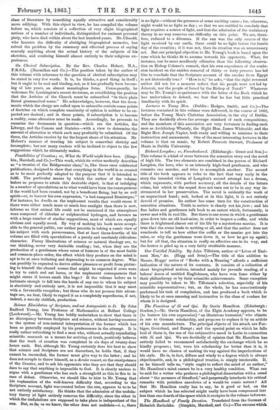Possibilities of Creation; or, What the World might have been.
(Simp- kin, Marshall, and Co.)—This work, which its writer modestly describes as "a treatise of the Bridgewater class," is, like those once celebrated publications, designed to show that everything in the world is so created as to be most perfectly adapted to the purpose that it is intended to fulfil. The particular means by which the author of the volume before us proposes to attain this desirable object, is that of indulging in a number of speculations as to what would have been the consequences if the world had been created, not by a beneficent Being, but by an evil spirit—or, to borrow his own expression, "a bad-tempered Demiurgus." For instance, he dwells on the unpleasant results that would ensue if there were either much more or much less sunlight than there is now, informs us that animal life could not be sustained if the atmosphere were composed of chlorine or sulphuretted hydrogen, and favours us with a large number of similar suppositions, most of which are equally obvious and equally novel. By way of making his book more accept- able to the general public, our author persists in taking a comic view of his subject with such perseverance, that at least three-fourths of his volume are filled with speculations of a purely and resolutely ridiculous character. Funny illustrations of science or natural theology are, to our thinking, never very desirable reading ; but, when they are the production of a gentleman whose sense of humour is of the most feeble and common-place order, the effect which they produce on the mind is apt to be at once irritating and depressing to no common degree. Who can possibly be expected to derive either pleasure or profit from pictur- ing to himself the absurd scenes that might be expected if cows were to try to catch and eat hares, or the unpleasant consequences that might ensue if horses smelt like bugs ? If the volume before us is fortunate enough to fall into the hands of any one to whom its subject is absolutely and entirely new, it is not impossible that it may meet 'with a favourable reception ; but those who do not possess this advan- tage are, we fear, likely to regard it as a completely superfluous, if not, indeed, a mos ely childish, production.






























 Previous page
Previous page